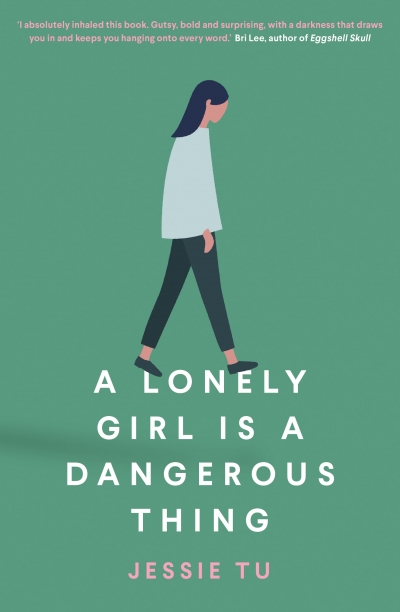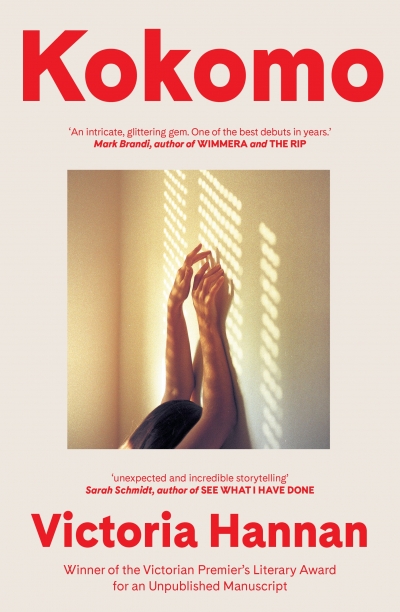Fiction
What a title, and what a début novel. Jessie Tu brings us Jena Lin, a twenty-two-year-old Asian Australian sex addict who was once a violin prodigy fêted around the world. She is a character to remember. The reader knows this from the beginning, and the compelling narrative tension is driven by the slow revelation of an event that occurred seven years before the novel begins.
... (read more)Aviation was a myth still in the making to my generation of Australian children. We cricked our necks watching a patch of sky for Amy Johnson’s arrival and, indeed, whenever an aeroplane engine was heard aloft, as if the watching itself was a necessary act of will, or prayer, to ensure the safety of those magnificent men and women whose photographs showed them always ear-muffed, be-goggled and leather-jacketed, smiling and jauntily waving thumbs up to us their earthbound worshippers.
... (read more)Carol Lefevre has shown herself adept at exploring connection and alienation in different genres. In The Happiness Glass (2018), the ambiguous zone between fiction and memoir forms a creative space within which Lefevre plumbs the intricacies of motherhood and loss; home and exile. Murmurations is imbued with similar tropes, the slight heft of the book belying its ethical density and the scope of its narrative ambition.
... (read more)Luke Horton’s novel The Fogging opens with a panic attack. Tom, the book’s protagonist, begins to tremble and sweat when the flight he is on – from Melbourne to Denpasar – hits turbulence. Tom is travelling with his long-term girlfriend, Clara, on a holiday they have organised more out of duty than from any real desire for travel, having booked their flights to use up his mother’s Frequent Flyer points. The turbulence wakes Tom’s ‘ringing nerves’ and anxiety starts ‘chewing his insides’, making him ‘shimmer’ and ‘pulse’. He panics, or comes close to panicking, a number of times throughout the novel. Horton’s handling of this – directly, sensorially, compassionately – is remarkable. Tom’s panic attacks are always vivid and bodily, and they always feel true to life. It’s rare to see this achieved so well in fiction.
... (read more)Richard Ford, born in 1944, is a North American novelist, short story writer, and anthologist of considerable distinction. His recurring character Frank Bascombe – The Sportswriter (1986), Independence Day (1995), The Lay of the Land (2006), Let Me Be Frank with You (2014) – is a commanding figure of American letters to rank with John Updike’s Rabbit Angstrom, each a protagonist used by his creator over several novels as a litmus test of his contemporaries and their not always united states.
... (read more)Towards the end of his Pulitzer Prize-winning novel The Overstory (2018), Richard Powers attempts to articulate why literature, or more precisely the novel, has struggled to encompass climate change: ‘To be human is to confuse a satisfying story with a meaningful one, and to mistake life for something huge with two legs. No: life is mobilized on a vastly larger scale, and the world is failing precisely because no novel can make the contest for the world seem as compelling as the struggles between a few lost people.’
... (read more)Of Elizabeth Jolley’s first novel, Palomino (1980), Nancy Keesing said it ‘establishes Elizabeth Jolley as absolutely one of the best writers of fiction in this country’ (ABR, March 1981). Of The Newspaper of Claremont Street, Tom Shapcott said its ‘capacity to touch the very nerve centre of human fragility, of exposing the tragedy in human needs within the small comedy of existence, is something I have not seen done with such delicate balance and precision since the ‘Pnin’ stories of Vladimir Nabakov’ (Fremantle Arts Centre Broadsheet, January-February, 1982). Sally McInerney’s judgement of The Newspaper is that ‘this slight and disturbing novel sways between sociopolitical allegory (about work and nonhuman relations) and conventional storytelling, and the two elements work against each other’ (National Times, 17–23 January, 1982). I agree with Keesing and Shapcott, but can understand why McInerney might have come to her conclusion.
... (read more)Kokomo has a startling beginning. ‘Mina knew in that moment what love is’, goes the first sentence. She is looking at Jack’s penis, which is compared to a soldier, a ballerina, a lighthouse, and a cooee. It is also the nicest penis she has ever seen.
... (read more)How the Light Gets In by M.J. Hyland & Tristessa And Lucido by Miriam Zolin
One of Frank Moorhouse’s stories in his collection The Americans, Baby (1972) vividly describes two people’s tentative steps across a divide. It is a sexual overture, but also one that defies the constraints of national stereotypes. Carl, an Australian university student, bristles at an American man’s advances. Uneasy about his new sexual identity, he is unable to shake the sense that he is consorting with the enemy, at a time of mass protests against the Vietnam War. At the story’s end, the two men lie together in bed holding hands. The American urges his Australian lover to wipe his tears, then comments obliquely: ‘I guess this is the way it is with us.’
... (read more)Last December, the Melbourne Age asked some prominent literary folk to name the best novel of the twentieth century. Readers would have found few surprises in the choices. Most of the punter – some novelist and a few literary critics – went for Proust’s Remembrance and Joyce’s Ulysses. Little argument there. But Ian Rankin, a Scottish crime fiction writer, chose something altogether different: Mario Puzo’s The Godfather (which, incidentally, is also Jackie Collins’ favourite novel of all time).
... (read more)









